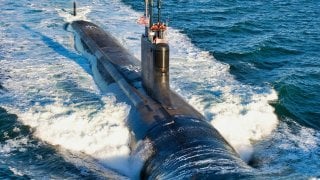Why Is the U.S. Navy Cutting a Virginia-Class Submarine?
The Biden administration's decision to cut one of two planned Virginia-class submarines from the upcoming budget has sparked criticism from both Republicans and Democrats.
Summary: The Biden administration's decision to cut one of two planned Virginia-class submarines from the upcoming budget has sparked criticism from both Republicans and Democrats. While some argue it leaves the Navy ill-prepared for potential conflicts with China, others suggest it reflects a need to prioritize spending in a resource-constrained environment. Representative Joe Courtney, a Democrat from Connecticut, who advocates for increased submarine production, criticizes the move, citing its implications for national security and job creation. However, amidst debates over military spending, some experts caution against overstating the significance of the decision, suggesting it may not greatly impact efforts to address the perceived missile gap with China.
The U.S. Navy's Virginia-Class Submarine Problem: Really Cut a Sub?
The Biden administration has cut one of two planned Virginia-class submarines from the upcoming year’s budget.
The decision has sharpened criticism that the U.S. Navy is not adequately equipping itself for a potential conflict with China. But President Joe Biden is also taking heat from fellow Democrats who represent states where the Virginia class is built.
“Democrats from states that build Navy subs are already vowing to fight the Biden administration’s decision to break with tradition and halve purchases of the Virginia-class attack sub in Pentagon spending plans unveiled on Monday,” Politico reported.
Rep. Joe Courtney, a Democrat who sits on the House Armed Services Seapower panel, has pushed in the past for increases to submarine production and was critical of the president’s budget.
“To me, this is going in the opposite direction of where the Navy, Joe Biden and the Congress has been going consistently, towards recognizing we need a bigger fleet,” Courtney said.
Courtney represents a Connecticut district that is home to General Dynamics Electric Boat shipyards, which help build the Virginia class.
Preparing for Conflict with China
Political considerations aside, the Virginia class is considered crucial to U.S. naval preparedness as the threat from China rises.
The Virginia is especially important because the submarine class was designed to accommodate heavy missile payloads with the Virginia Payload Module. This helps mitigate the gap that grew while the U.S. was beholden to a treaty with Russia that prohibited the stockpiling of intermediate-range missiles. China, unfettered by any such treaty, built up a considerable arsenal of these missiles, developing a niche advantage over the United States.
The Virginia class, modified to carry more missiles than preceding classes, is intended specifically to address this shortfall. The administration’s decision to cut production of a Virginia-class boat thus has implications for the effort to close the missile gap with China – and more generally, to be ready for a possible conflict with that nation.
Can’t Have it All
Despite a yearly defense budget that is nearing a trillion dollars, American resources are finite, and choices need to be made.
Frankly, if the Biden administration can’t fit another Virginia submarine into the budget, it probably means the U.S. does not need another Virginia-class submarine, despite the drive to close a missile gap with China.
In a perfect world, the U.S. would be producing multiple Virginia-class submarines each year. But with such a substantial military budget, its absence from the final request indicates the second Virginia submarine sat quite low on the hierarchy of needs, as arbitrarily as those needs might be defined.
Rep. Courtney’s complaints offer insights into the nature of military spending. Courtney is dressing up his complaint with a national security gloss, but at its heart, it is a complaint about job creation. And when you multiply Courtney’s perspective across multiple districts and throw in the backing of corporate entities, you’re going to find yourself with a peacetime military budget exceeding what the U.S. spent during World War II, when it operated a multi-front war with existential ramifications.
My point is: Don’t lose too much sleep over the slashing of next year’s second Virginia-class submarine.
About the Author: Harrison Kass
Harrison Kass is a defense and national security writer with over 1,000 total pieces on issues involving global affairs. An attorney, pilot, guitarist, and minor pro hockey player, Harrison joined the US Air Force as a Pilot Trainee but was medically discharged. Harrison holds a BA from Lake Forest College, a JD from the University of Oregon, and an MA from New York University. Harrison listens to Dokken.


